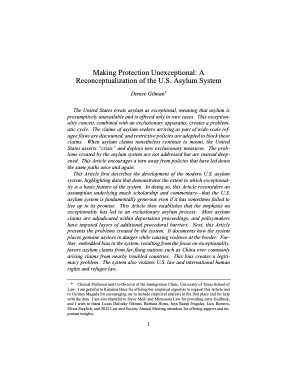By Denise Gilman
The United States treats asylum as exceptional, meaning that asylum is presumptively unavailable and is offered only in rare cases. This exceptionality conceit, combined with an exclusionary apparatus, creates a problematic cycle. The claims of asylum seekers arriving as part of wide-scale refugee flows are discounted, and restrictive policies are adopted to block these claims. When asylum claims nonetheless continue to mount, the United States asserts “crisis” and deploys new exclusionary measures. The problems created by the asylum system are not addressed but are instead deepened. This Article encourages a turn away from policies that have led down the same paths once and again. This Article first describes the development of the modern U.S. asylum system, highlighting data that demonstrates the extent to which exceptionality is a basic feature of the system. In doing so, this Article reconsiders an assumption underlying much scholarship and commentary—that the U.S. asylum system is fundamentally generous even if it has sometimes failed to live up to its promise. This Article then establishes that the emphasis on exceptionality has led to an exclusionary asylum process. Most asylum claims are adjudicated within deportation proceedings, and policymakers have imposed layers of additional procedural barriers. Next, this Article presents the problems created by the system. It documents how the system places genuine asylees in danger while causing violence at the border. Further, embedded bias in the system, resulting from the focus on exceptionality, favors asylum claims from far-flung nations such as China over commonly arising claims from nearby troubled countries. This bias creates a legitimacy problem. The system also violates U.S. law and international human rights and refugee law This Article concludes by offering suggestions for more stable, effective, and humane policies to address asylum seekers in the United States. In addition to eliminating many existing substantive restrictions on asylum, the system should incorporate group-based eligibility for applicants from designated nations or situations that are sending significant refugee flows. Finally, the United States should adopt a specialiZed non-adversarial asylum system for all cases, apart from the deportation system and with genuine independent review of denials of asylum.
Loyola University Chicago Law Journal, 2023.



